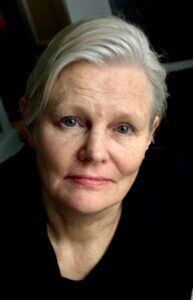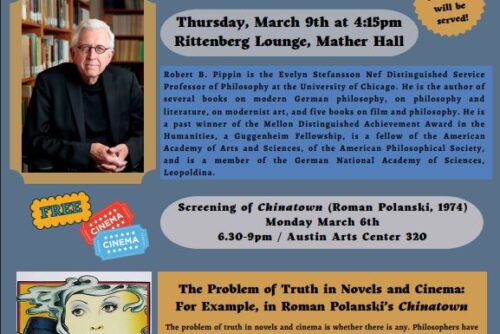A.K. Smith Scholars Series
SPRING 2025 A.K. Smith Scholars Series Schedule


“The Past is a Foreign Country”: Mary Harron on Adapting History for the Screen
&
25th Anniversary Screening of American Psycho; Followed by Q&A with Mary Harron
“Adapting History for the Screen”:
Tuesday, January 28 @ 12:15 p.m. – Rittenberg Lounge, Mather Hall
followed by
Pizza @ 4pm, then screening of American Psycho @ 4:15pm – Cinestudio
Presented by English and Film Studies; Co-sponsored by Trinity Institute for Interdisciplinary Studies, Women and Gender Studies, Philosophy, Sociology and Theater & Dance.
One of the most distinctive voices of the independent film movement of the last twenty five years, Mary Harron made her debut as a feature-film writer / director in 1996 with I Shot Andy Warhol in 1996. The film won star Lili Taylor a Special Jury Award at the Sundance Film Festival, and garnered Independent Spirit Award and London Film Critic Circle nominations for best first feature. Her next film, in 2000, was the once notorious and now revered American Psycho starring Christian Bale and co-written with Guinevere Turner. This was followed by The Notorious Bettie Page in 2006 (also co-written with Guinevere Turner), cult horror film The Moth Diaries in 2011 and Charlie Says, written by Guinevere Turner and starring Matt Smith as Charles Manson, in 2019.
Mary began her directing career making short films and documentaries in the UK for the BBC and Channel Four in the late 1980s. In the US she has directed episodes of many acclaimed television series including Homicide: Life on the Street, Oz, The L Word, Six Feet Under, Big Love and The Following, as well as the TV movie Anna Nicole. In 2017 she directed all six episodes of the multiple award-winning Netflix series Alias Grace, adapted by Sarah Polley from the novel by Margaret Atwood.
Mary’s latest film, released in 2022, is DaliLand about the last years of Salvador Dali and his tempestuous marriage with his wife Gala, starring Ben Kingsley, Barbara Sukowa and Chris Briney. She is planning to shoot a new feature, The Highway That Eats People, in 2025.

